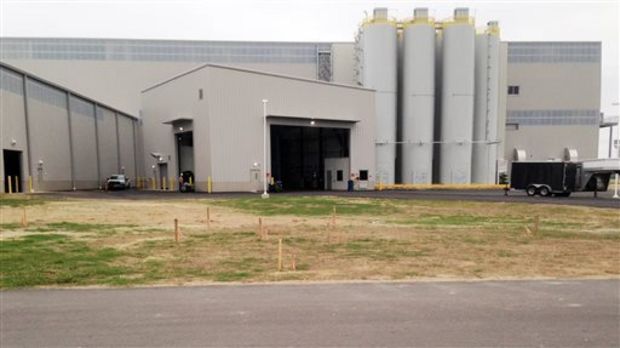

WEST POINT, Miss. (AP) — The economy has gotten a lot better for Era Walker. The West Point resident has gone from making $9.75 an hour at a pig farm to $15 an hour at the CalStar Products brick plant in Columbus.
Walker, a 45-year-old mother of three, said she’s “making enough now” to take care of her family.
She’s a beneficiary of the economic policy of incumbent Republicans, including Gov. Phil Bryant and Lt. Gov. Tate Reeves. Authorities offered millions in incentives to bring CalStar to Mississippi.
Bryant, citing an unemployment rate that’s fallen from 8.9 percent when he took office, has been touting his stewardship of Mississippi’s economy.
“The economy, although not where we want it, is trending in the right direction,” he said in an interview. “Those are the kinds of dynamics that we are looking at that indicate really positive growth for the future.”
But Walker, getting her hair styled one Friday in West Point, wasn’t feeling positive. The local economy was hard-hit by industrial closures including the 2007 shutdown of Sara Lee Corp.’s Bryan Foods plant, the town’s longtime anchor. Walker said times remain hard, despite the opening of the first phase of Yokohama Rubber Co.’s tire plant north of town.
“We’ve got people sleeping in their cars right now, who can’t figure out a place to stay,” Walker said.
West Point, in some ways, is Mississippi writ small. The state has made economic progress in the last four years, but less than the nation. Mississippi’s unemployment rate has fallen more slowly, wages have increased only half as fast as elsewhere, employer payrolls have inched forward, and the overall economy has barely grown.
That means the nation’s poorest state is falling further behind the other 49.
“We didn’t get hit as hard as many states in the depth of the recession, but our recovery has been much worse than the other states, much slower,” said state economist Darrin Webb. He said Mississippi’s economy has struggled for the last 15 years and needs strong national growth to pull it ahead.
The number of Mississippians on employer payrolls in September remained 2.6 percent below its prerecession high. Unemployment has fallen from 10.8 percent in March 2010 to 6.1 percent, but pre-2015 declines were driven by a shrinking labor force.
Bryant has focused on industrial recruitment. Mississippi and local governments spent $82 million to incentivize Yokohama’s first phase, scheduled to hire 500 workers. Total state and local incentives, including tax breaks, could total more than $330 million if Yokohama builds four phases and hires 2,000 workers.
Drake Langley, a clerk at downtown’s Kellogg Hardware, said Yokohama construction buoyed sales, an increase that Mayor Robbie Robertson said is shared by businesses citywide.
Tyler Sumner, a computer technician at Digital Impact, said the economy has improved in recent years, but he’s considering moving, saying there are few high-paying jobs locally for computer workers.
“I think people were overly optimistic as to what Yokohama would bring to the city,” Sumner said.
______________________________
What major-party candidates for governor and lieutenant governor in Mississippi say about the economy:
_______________________
PHIL BRYANT, Republican running for re-election as governor: “I’ve done what I said I would do. We’ve put Mississippi to work. Again, we’ve got a lot of work left to do.” After focusing on recruiting industry, Bryant promises “the most comprehensive workforce training plan in Mississippi’s history” and increased focus on high school graduation. “There are several hundred thousand potential employees or employees in this state that do not have the middle skills to fill the jobs that will be occurring into the future.”
_______________________
ROBERT GRAY, Democratic nominee for governor: “I see too many opportunities we’re missing out on.” He says expanding Medicaid and more transportation spending will improve the economy, and wants to spend Mississippi’s Rainy Day Fund. “Put some of that into the economy or put all of it into the economy, it’s going to generate money.” Gray pledges to improve Mississippi’s image, saying business will improve with “a better identity, something that people could trust and believe in and rely on.”
_______________________
TATE REEVES, Republican running for re-election as lieutenant governor: “We’re seeing economic growth, but it is economic growth that is much slower than a pace I would like it to be.” He said government encourages job growth by levying fair taxes, educating residents and not overspending. “Government’s role is to create an environment that encourages the private sector to invest capital and create jobs.” Reeves said he wants to eliminate the corporate franchise tax on invested capital and improve education and worker training.
_______________________
TIM JOHNSON, Democratic nominee lieutenant governor: “Our economy is not doing well at all. From everything I’ve seen, we’ve had basically zero job growth.” Johnson wants to expand Medicaid, improving roads and increasing education funding. He said building more and better roads would create jobs and improve the economy. “I think government is about creating the right atmosphere for business to want to be here.”
______________________________
While Mississippi’s economy has grown in recent years, economic data generally show smaller improvements than have taken place nationwide. Here’s a glance at some selected measures of the job market, income, poverty and the overall economy:
UNEMPLOYMENT RATE
Mississippi: 6.1 percent in September 2015, down from 8.9 percent in January 2012.
United States: 5.1 percent in September 2015, down from 8.3 percent in January 2012.
_______________________
EMPLOYER PAYROLLS
Mississippi: Increased 3.9 percent from January 2012 to September 2015.
United States: Increased 7.2 percent from January 2012 to September 2015.
_______________________
AVERAGE WEEKLY WAGE
Mississippi: $711 in 2015’s first quarter, up 3.3 percent from $688 in 2012’s first quarter.
United States: $1,048 in 2015’s first quarter, up 6.6 percent from $983 in 2012’s first quarter.
_______________________
POVERTY RATE
Mississippi: 21.5 percent in 2014, down from 22.6 percent in 2011.
United States: 15.5 percent in 2014, down from 15.9 percent in 2011.
_______________________
GROWTH OF ECONOMY
Mississippi: 1 percent from 2011 through 2014.
United States: 6.3 percent from 2011 through 2014.
Sources: U.S. Bureau of Labor Statistics, U.S. Bureau of Economic Analysis, U.S. Census Bureau.



